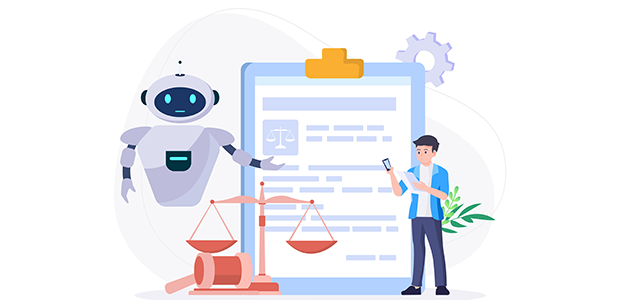
One in three would let a robot lawyer represent them – with human oversight
A major new survey, from legal intelligence platform Robin AI, has revealed a severe lack of trust in the legal industry. Just one in 10 people across the US and UK said they fully trust law firms, but while increasingly open to AI-powered legal services, few are ready to let technology take over without human oversight.
Perspectus Global polled a representative sample of 4,152 people across both markets. An overwhelming majority see Big Law as “expensive”, “elitist” or “intimidating” but only 30% of respondents would allow a robot lawyer – that is, an AI system acting alone – to represent them in a legal matter. On average, respondents said they would need a 57% discount to choose an AI lawyer over a human.
When asked who they trust most for legal advice, just 4% said they would trust AI on its own. The vast majority preferred either a traditional lawyer (69%) or a lawyer using AI as a support tool (27%).
“The legal industry needs serious reform,” said Richard Robinson, CEO and Founder of Robin AI. “People want faster, cheaper legal help, but not at the expense of human judgment. We’re doubling down on building AI to work alongside lawyers, not instead of them, as a result of this survey.
Trust AI with contracts, not conflict
The public draws a hard line between low-stakes paperwork and more personal matters. When asked what legal tasks they would feel comfortable outsourcing to AI, many were open to using it for administrative issues:
- Reviewing a rental agreement – 49%
- Writing a will – 47%
- Challenging a parking ticket – 46%
But support dropped sharply for more emotionally or legally complex matters:
- Divorce – 17%
- Redundancy disputes – 17%
- Criminal defence – 11%
While 68% said they would be happy for a lawyer to use AI to check for errors or speed things up, a strong majority said they would not trust AI to assist with criminal law (61%).
Only 27% of people believe an AI-powered paralegal could perform at the same standards as a fully-qualified human lawyer.
Cost is king, but trust is the gatekeeper
When asked what would most encourage them to use AI in legal services, the top answers were:
- Lower cost – 47%
- 24/7 availability – 35%
- Faster resolution – 35%
On average, people said they would need to see at least a 57% discount to choose an AI lawyer over a traditional one.
Law still seen as only for the rich
The survey also highlights public frustration with the legal system more broadly. Respondents described it as:
- “Expensive” – 64%
- “For rich people” – 34%
- “Intimidating” – 30%
- “Elitist” – 21%
Only 10% said legal services are truly accessible to everyone, and just 23% believe good quality services are available to the average person. More than half said that’s only true if you can afford it.
“The current legal system wasn’t built for speed, transparency or accessibility – it was built for those who could afford to wait, navigate the jargon, and pay the bill,” said Robinson.
“When 90% of people say legal services aren’t truly accessible, that’s more than a bug, it’s a systemic problem. With the right safeguards, AI gives us a rare chance to rebuild it for everyone, not just the privileged few,” he added.
UK and US views mostly aligned – but key differences remain
While attitudes toward legal AI were largely consistent across the UK and US, support for mandatory AI safety or compliance training was higher in the UK (82%) than in the US (76%). Meanwhile, respondents in the US were more likely to say they trusted large corporate law firms “a great deal” (13%, compared to 8% in the UK).
UK respondents were also slightly more likely to describe the legal system as “elitist” (23% vs 18%).
These differences suggest that while both countries are wary of handing legal control to AI, their trust in the existing system – and their desire for oversight – varies in important ways.
The public wants human-led, safer AI
Despite concerns, many see potential in AI – as long as it’s properly regulated. 82% of people want lawyers to take a safety or compliance course before using AI tools.
Respondents also associated legal AI services with being:
- More affordable – 47%
- Less biased – 38%
- More accurate – 24%
- More transparent – 21%
“People want something better, not just faster,” said Robinson. “That’s why we believe in human-led AI: to increase access, without sacrificing accountability.”
“Legal AI should make life easier for lawyers and cheaper for clients,” he added. “But trust must come first.”
Robin AI is used by 14 members of the Fortune 500, with top clients including UBS, GE, and KPMG – helping lawyers save time and focus on higher-value work while the AI handles the paperwork.
For more startup news, check out the other articles on the website, and subscribe to the magazine for free. Listen to The Cereal Entrepreneur podcast for more interviews with entrepreneurs and big-hitters in the startup ecosystem.

